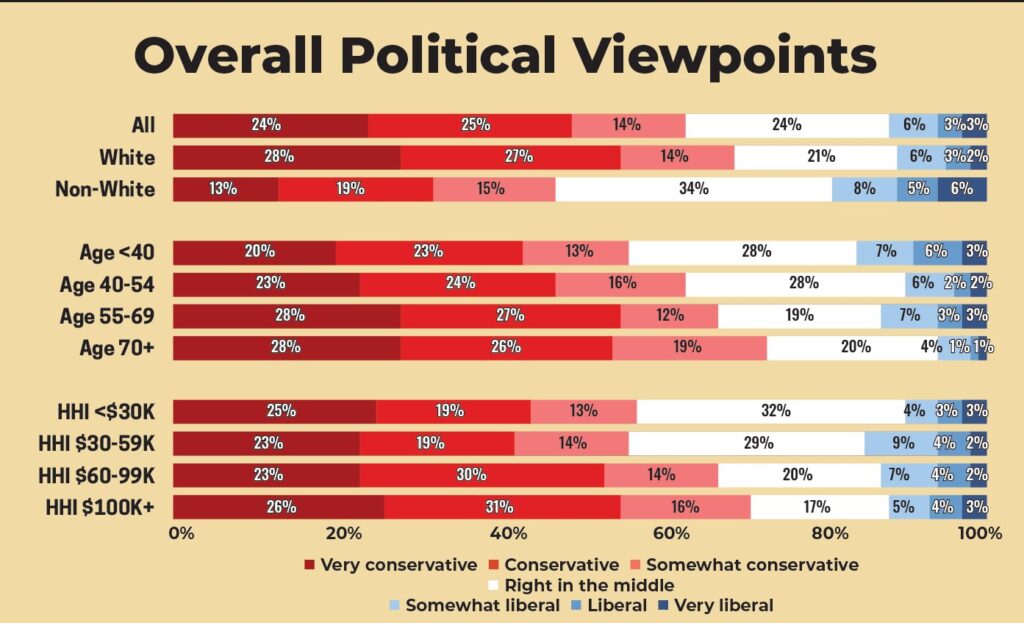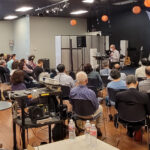
EXPORT, Pa. (BP) – More than a third of evangelicals describe themselves as politically moderate or liberal, a new study found, but most across the evangelical spectrum profess the same bible-based beliefs and practices.
Evangelicals also believe pastors and churches should be publicly engaged in various politically connected issues that overlap with biblical values, but disagree on the extent of engagement, Grey Matters Research and Infinity Concepts found in the study.
“Being a conservative evangelical does not automatically make one a gun-toting, border-patrolling Donald Trump die-hard, any more than being a liberal evangelical makes one a pro-choice, LGBTQ+ supporting Joe Biden sycophant,” Grey Matter Research President Ron Sellers said in releasing the findings. “The perception of an army of evangelicals calling for a militant church with its hands in everything is simply a fallacy.”
While most evangelicals, 63 percent, described themselves as politically conservative in the study, “Evangelicals in the Public Arena: Understanding Their Political, Moral, and Social Views” 24 percent described themselves as “in the middle” or moderate, while 12 percent said they are liberal.
But majorities of conservative, moderate and liberal evangelicals oppose abortion, premarital sex, homosexual sex and pornography, according to the study conducted in late 2023 and early 2024 among more than 1,000 Protestant evangelicals.
Similarly, majorities of evangelicals across the political spectrum pray, attend worship and small groups, read and study the Bible, watch Christian television and listen to Christian radio with equal frequency.
Regarding involvement in public policy issues, researchers asked evangelicals whether churches and pastors should be involved in public discourse about transgender issues, abortion, election integrity and fairness, racism and racial justice, antisemitism, parental rights in individual children’s education, donor privacy, public expressions of religious faith, free speech and censorship, gun laws, and criminal justice reform.
While respondents said the church and pastors should engage in discussions on all issues, respondents differed regarding the degree of involvement, with 54 percent saying they should be very involved in discussions regarding abortion, and 51 percent saying they should be very involved in discussions regarding public expressions of religious faith.
Other issues drawing the highest responses are free speech and censorship (48 percent), parental rights (46 percent), antisemitism (45 percent), racism and racial justice (45 percent), and transgender issues (42 percent.)
Least often, evangelicals thought churches and pastors should be very engaged in discussions on election integrity and fairness (34 percent), criminal justice reform (32 percent), donor privacy (32 percent), and gun legislation (30 percent).
Whites, higher-income evangelicals, and those 55 and older are most often conservative; while non-white evangelicals more often identify as moderate or liberal. But even among non-white evangelicals, 48 percent are conversative, with 34 percent in the middle and 19 percent liberal.
To limit the study to Protestant evangelicals, researchers relied on a definition of evangelicals crafted by Lifeway Research and Grey Matters, and approved by the National Association of Evangelicals. Evangelicals are described as those who hold the Bible as the highest authority for what they believe, say personal evangelism is important, believe salvation is only through Jesus Christ, and believe only those who profess Jesus as Savior receive eternal life.
The full report is available here.








-headshot.jpg)














